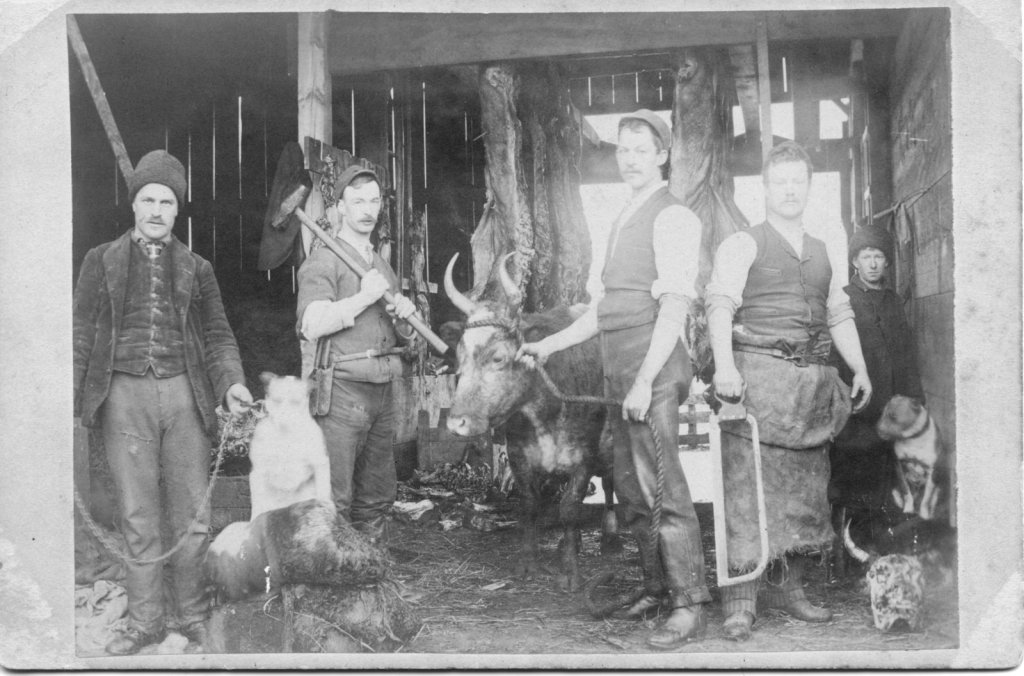
Slaughterhouse
The gore of the slaughterhouse drove him insane. The terror. The horror. The brutality. The blood. The entrails. The cries. The endless death. It all drove him insane.
For a man of the slaughterhouse, it is common to return home with black under the fingernails. The black of once crimson blood that can’t be completely removed with a toothpick or a brush. A blackness under the nails that, in moments of stillness, can be smelled – almost tasted – as metallic. Some say it’s the smell of iron. Most men of the slaughterhouse say it’s the odor of copper.
No amount of scrubbing or picking underneath the fingernails can remove all the blackness. No amount of soap or even bleach can remove the faint, metallic odor that too often reveals itself in the stillness.
The slaughterhouse, as it does most men, drove this man insane. And his insanity, in turn, drove his wife insane too.
In the midst of their insanity, they decided to have a child. They hoped and prayed it would be a healthy son.
He told his wife, “When my son is old enough, I will send him to work in the slaughterhouse. It has earned me a fine living, as it should for him too. That way, he will learn to respect and understand our ways. I would wish for him to follow in my footsteps. To follow me in my legacy. And then, if he has a son, my grandson might do the same as us.”
His wife agreed.
“Let him earn his keep in the slaughterhouse,” the man said. “It is a noble profession. Let him come home with the same blackness under his fingernails. Let him take pride – let him have honor in it – just as I do.”
Again, his wife agreed.
“I will instill in him, as soon as he is old enough to understand, the nobility of earning one’s keep in the slaughterhouse.”
“Very good,” the wife said.
“Let us teach him of duty and honor and respect for all noble things – including the slaughterhouse which has given us the means to support him. Let us instill in him respect for us and our heritage so that he will never fall astray.”
“Let us not fail him by allowing him to fall from the flock,” the wife said. “Will our rearing not have been in vain should he fall from the heard? And how better to keep him close than by instilling in him honor and respect for our traditions and ways.”
“It is not easy work in the slaughterhouse,” the husband said. “Many men are broken by it. So I think we shall spend his years of childhood preparing him. Toughening him.”
“But how?”
“Perhaps we should raise chickens or rabbits or sheep,” he said. “Then I can ease him into the ways of pain, slaughter, terror and gore. I can take him by the hand and ease him into it. That way, he will have the assurance of a trusted authority beside him – assuring him that everything is alright as the blade slices throats, the hammer crushes skulls and the saw tears through flesh and bone.”
“I knew I married a good man,” the wife said. “You will make an outstanding father.”
“He will need to grow accustomed to the smell,” the husband said. “The earlier the better. I believe I should start him with chickens, then advance to rabbits, then sheep.”
“An excellent way for a father and son to bond,” she said.
“I think when he grows older, he will understand, and be most grateful for the lessons,” the husband said.
“Certainly he will,” his wife said. “For you are, indeed, a fine husband and will surely be the finest of fathers as well.”

And so it was. Though it reads as a fiction, it is most like a snapshot of time past…
LikeLike
mostly a commentary on how a blindness to disfunction becomes a generational thing. thanks so much for the read and comment. truly appreciate it.
LikeLike